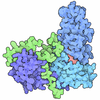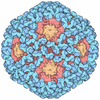[English] 日本語
 Yorodumi
Yorodumi- PDB-6q1n: Glucocerebrosidase in complex with pharmacological chaperone IMX8 -
+ Open data
Open data
- Basic information
Basic information
| Entry | Database: PDB / ID: 6q1n | ||||||
|---|---|---|---|---|---|---|---|
| Title | Glucocerebrosidase in complex with pharmacological chaperone IMX8 | ||||||
 Components Components | Glucosylceramidase | ||||||
 Keywords Keywords | HYDROLASE/INHIBITOR /  pharmacological chaperone / pharmacological chaperone /  Gaucher disease / glycosidase / Gaucher disease / glycosidase /  inhibitor / pKa / inhibitor / pKa /  HYDROLASE / HYDROLASE-INHIBITOR complex HYDROLASE / HYDROLASE-INHIBITOR complex | ||||||
| Function / homology |  Function and homology information Function and homology informationpositive regulation of protein lipidation /  steryl-beta-glucosidase activity / beta-glucoside catabolic process / positive regulation of neuronal action potential / cerebellar Purkinje cell layer formation / steryl-beta-glucosidase activity / beta-glucoside catabolic process / positive regulation of neuronal action potential / cerebellar Purkinje cell layer formation /  galactosylceramidase / termination of signal transduction / galactosylceramidase / termination of signal transduction /  galactosylceramidase activity / positive regulation of autophagy of mitochondrion in response to mitochondrial depolarization / lymphocyte migration ...positive regulation of protein lipidation / galactosylceramidase activity / positive regulation of autophagy of mitochondrion in response to mitochondrial depolarization / lymphocyte migration ...positive regulation of protein lipidation /  steryl-beta-glucosidase activity / beta-glucoside catabolic process / positive regulation of neuronal action potential / cerebellar Purkinje cell layer formation / steryl-beta-glucosidase activity / beta-glucoside catabolic process / positive regulation of neuronal action potential / cerebellar Purkinje cell layer formation /  galactosylceramidase / termination of signal transduction / galactosylceramidase / termination of signal transduction /  galactosylceramidase activity / positive regulation of autophagy of mitochondrion in response to mitochondrial depolarization / lymphocyte migration / galactosylceramidase activity / positive regulation of autophagy of mitochondrion in response to mitochondrial depolarization / lymphocyte migration /  glucosylceramidase / glucosylceramide catabolic process / scavenger receptor binding / glucosylceramidase / glucosylceramide catabolic process / scavenger receptor binding /  regulation of lysosomal protein catabolic process / sphingosine biosynthetic process / autophagosome organization / regulation of lysosomal protein catabolic process / sphingosine biosynthetic process / autophagosome organization /  glucosylceramidase activity / microglial cell proliferation / glucosylceramidase activity / microglial cell proliferation /  regulation of TOR signaling / regulation of TOR signaling /  glucosyltransferase activity / ceramide biosynthetic process / glucosyltransferase activity / ceramide biosynthetic process /  lipid storage / response to thyroid hormone / microglia differentiation / sphingolipid metabolic process / Glycosphingolipid catabolism / pyramidal neuron differentiation / lipid glycosylation / brain morphogenesis / lipid storage / response to thyroid hormone / microglia differentiation / sphingolipid metabolic process / Glycosphingolipid catabolism / pyramidal neuron differentiation / lipid glycosylation / brain morphogenesis /  Hydrolases; Glycosylases; Glycosidases, i.e. enzymes that hydrolyse O- and S-glycosyl compounds / response to pH / positive regulation of protein-containing complex disassembly / Hydrolases; Glycosylases; Glycosidases, i.e. enzymes that hydrolyse O- and S-glycosyl compounds / response to pH / positive regulation of protein-containing complex disassembly /  motor behavior / neuromuscular process / motor behavior / neuromuscular process /  Transferases; Glycosyltransferases; Hexosyltransferases / hematopoietic stem cell proliferation / lysosome organization / response to testosterone / response to dexamethasone / Transferases; Glycosyltransferases; Hexosyltransferases / hematopoietic stem cell proliferation / lysosome organization / response to testosterone / response to dexamethasone /  glycosyltransferase activity / Association of TriC/CCT with target proteins during biosynthesis / negative regulation of interleukin-6 production / homeostasis of number of cells / antigen processing and presentation / glycosyltransferase activity / Association of TriC/CCT with target proteins during biosynthesis / negative regulation of interleukin-6 production / homeostasis of number of cells / antigen processing and presentation /  regulation of macroautophagy / establishment of skin barrier / negative regulation of protein-containing complex assembly / positive regulation of protein dephosphorylation / cell maturation / respiratory electron transport chain / cellular response to starvation / cholesterol metabolic process / lysosomal lumen / negative regulation of MAP kinase activity / determination of adult lifespan / regulation of macroautophagy / establishment of skin barrier / negative regulation of protein-containing complex assembly / positive regulation of protein dephosphorylation / cell maturation / respiratory electron transport chain / cellular response to starvation / cholesterol metabolic process / lysosomal lumen / negative regulation of MAP kinase activity / determination of adult lifespan /  trans-Golgi network / trans-Golgi network /  autophagy / negative regulation of inflammatory response / response to estrogen / positive regulation of proteasomal ubiquitin-dependent protein catabolic process / T cell differentiation in thymus / cellular response to tumor necrosis factor / proteasome-mediated ubiquitin-dependent protein catabolic process / neuron apoptotic process / negative regulation of neuron apoptotic process / autophagy / negative regulation of inflammatory response / response to estrogen / positive regulation of proteasomal ubiquitin-dependent protein catabolic process / T cell differentiation in thymus / cellular response to tumor necrosis factor / proteasome-mediated ubiquitin-dependent protein catabolic process / neuron apoptotic process / negative regulation of neuron apoptotic process /  lysosome / lysosomal membrane / lysosome / lysosomal membrane /  signaling receptor binding / signaling receptor binding /  Golgi apparatus / Golgi apparatus /  endoplasmic reticulum / extracellular exosome endoplasmic reticulum / extracellular exosomeSimilarity search - Function | ||||||
| Biological species |   Homo sapiens (human) Homo sapiens (human) | ||||||
| Method |  X-RAY DIFFRACTION / X-RAY DIFFRACTION /  MOLECULAR REPLACEMENT / Resolution: 2.526 Å MOLECULAR REPLACEMENT / Resolution: 2.526 Å | ||||||
 Authors Authors | Vickers, C. / Withers, S.G. / Boraston, A.B. | ||||||
| Funding support |  Canada, 1items Canada, 1items
| ||||||
 Citation Citation |  Journal: To Be Published Journal: To Be PublishedTitle: Pharmacological chaperones for GCase that switch conformation with pH enhance enzyme levels in Gaucher animal models. Authors: Santana, A.G. / Robinson, K. / Vickers, C. / Chen, H. / Zhou, S. / Boraston, A.B. / Clarke, L.A. / Withers, S.G. | ||||||
| History |
|
- Structure visualization
Structure visualization
| Structure viewer | Molecule:  Molmil Molmil Jmol/JSmol Jmol/JSmol |
|---|
- Downloads & links
Downloads & links
- Download
Download
| PDBx/mmCIF format |  6q1n.cif.gz 6q1n.cif.gz | 212.7 KB | Display |  PDBx/mmCIF format PDBx/mmCIF format |
|---|---|---|---|---|
| PDB format |  pdb6q1n.ent.gz pdb6q1n.ent.gz | 177.4 KB | Display |  PDB format PDB format |
| PDBx/mmJSON format |  6q1n.json.gz 6q1n.json.gz | Tree view |  PDBx/mmJSON format PDBx/mmJSON format | |
| Others |  Other downloads Other downloads |
-Validation report
| Arichive directory |  https://data.pdbj.org/pub/pdb/validation_reports/q1/6q1n https://data.pdbj.org/pub/pdb/validation_reports/q1/6q1n ftp://data.pdbj.org/pub/pdb/validation_reports/q1/6q1n ftp://data.pdbj.org/pub/pdb/validation_reports/q1/6q1n | HTTPS FTP |
|---|
-Related structure data
- Links
Links
- Assembly
Assembly
| Deposited unit | 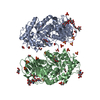
| |||||||||
|---|---|---|---|---|---|---|---|---|---|---|
| 1 | 
| |||||||||
| 2 | 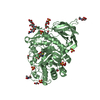
| |||||||||
| Unit cell |
| |||||||||
| Components on special symmetry positions |
|
- Components
Components
-Protein , 1 types, 2 molecules AB
| #1: Protein |  / Glucocerebrosidase / GlucocerebrosidaseMass: 55640.168 Da / Num. of mol.: 2 Source method: isolated from a genetically manipulated source Source: (gene. exp.)   Homo sapiens (human) / Production host: Homo sapiens (human) / Production host:   Cricetulus griseus (Chinese hamster) Cricetulus griseus (Chinese hamster)References: UniProt: B2R6A7, UniProt: P04062*PLUS,  glucosylceramidase glucosylceramidase |
|---|
-Sugars , 4 types, 5 molecules 
| #2: Polysaccharide | 2-acetamido-2-deoxy-beta-D-glucopyranose-(1-4)-2-acetamido-2-deoxy-beta-D-glucopyranose / Mass: 424.401 Da / Num. of mol.: 1 / Source method: obtained synthetically / Mass: 424.401 Da / Num. of mol.: 1 / Source method: obtained synthetically |
|---|---|
| #3: Polysaccharide | alpha-L-fucopyranose-(1-6)-2-acetamido-2-deoxy-beta-D-glucopyranose / Mass: 367.349 Da / Num. of mol.: 1 / Mass: 367.349 Da / Num. of mol.: 1Source method: isolated from a genetically manipulated source |
| #4: Polysaccharide | alpha-D-mannopyranose-(1-4)-2-acetamido-2-deoxy-beta-D-glucopyranose-(1-4)-2-acetamido-2-deoxy-beta- ...alpha-D-mannopyranose-(1-4)-2-acetamido-2-deoxy-beta-D-glucopyranose-(1-4)-2-acetamido-2-deoxy-beta-D-glucopyranose / Mass: 586.542 Da / Num. of mol.: 1 / Source method: obtained synthetically / Mass: 586.542 Da / Num. of mol.: 1 / Source method: obtained synthetically |
| #8: Sugar |  N-Acetylglucosamine N-Acetylglucosamine |
-Non-polymers , 4 types, 390 molecules 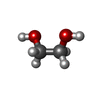
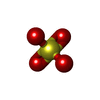
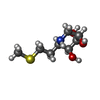




| #5: Chemical | ChemComp-EDO /  Ethylene glycol Ethylene glycol#6: Chemical | ChemComp-SO4 /  Sulfate Sulfate#7: Chemical | #9: Water | ChemComp-HOH / |  Water Water |
|---|
-Details
| Has ligand of interest | Y |
|---|
-Experimental details
-Experiment
| Experiment | Method:  X-RAY DIFFRACTION / Number of used crystals: 1 X-RAY DIFFRACTION / Number of used crystals: 1 |
|---|
- Sample preparation
Sample preparation
| Crystal | Density Matthews: 3.27 Å3/Da / Density % sol: 62.36 % |
|---|---|
Crystal grow | Temperature: 291.15 K / Method: vapor diffusion, hanging drop Details: 1.5 M (NH4)2SO4, 0.1 M Bis Tris (pH 4.9) containing 0.1 M CsCl |
-Data collection
| Diffraction | Mean temperature: 100 K / Serial crystal experiment: N | |||||||||||||||||||||||||||||||||||||||||||||||||||||||||||||||||||||||||||||||||||||||||||||||||||||||||||||||||||||||||||||||||||||||||||||||||||||||||||||||||||||||||||||||||||||||||||||
|---|---|---|---|---|---|---|---|---|---|---|---|---|---|---|---|---|---|---|---|---|---|---|---|---|---|---|---|---|---|---|---|---|---|---|---|---|---|---|---|---|---|---|---|---|---|---|---|---|---|---|---|---|---|---|---|---|---|---|---|---|---|---|---|---|---|---|---|---|---|---|---|---|---|---|---|---|---|---|---|---|---|---|---|---|---|---|---|---|---|---|---|---|---|---|---|---|---|---|---|---|---|---|---|---|---|---|---|---|---|---|---|---|---|---|---|---|---|---|---|---|---|---|---|---|---|---|---|---|---|---|---|---|---|---|---|---|---|---|---|---|---|---|---|---|---|---|---|---|---|---|---|---|---|---|---|---|---|---|---|---|---|---|---|---|---|---|---|---|---|---|---|---|---|---|---|---|---|---|---|---|---|---|---|---|---|---|---|---|---|---|
| Diffraction source | Source:  ROTATING ANODE / Type: RIGAKU MICROMAX-007 HF / Wavelength: 1.54178 Å ROTATING ANODE / Type: RIGAKU MICROMAX-007 HF / Wavelength: 1.54178 Å | |||||||||||||||||||||||||||||||||||||||||||||||||||||||||||||||||||||||||||||||||||||||||||||||||||||||||||||||||||||||||||||||||||||||||||||||||||||||||||||||||||||||||||||||||||||||||||||
| Detector | Type: DECTRIS PILATUS3 R 200K-A / Detector: PIXEL / Date: Dec 8, 2017 | |||||||||||||||||||||||||||||||||||||||||||||||||||||||||||||||||||||||||||||||||||||||||||||||||||||||||||||||||||||||||||||||||||||||||||||||||||||||||||||||||||||||||||||||||||||||||||||
| Radiation | Protocol: SINGLE WAVELENGTH / Monochromatic (M) / Laue (L): M / Scattering type: x-ray | |||||||||||||||||||||||||||||||||||||||||||||||||||||||||||||||||||||||||||||||||||||||||||||||||||||||||||||||||||||||||||||||||||||||||||||||||||||||||||||||||||||||||||||||||||||||||||||
| Radiation wavelength | Wavelength : 1.54178 Å / Relative weight: 1 : 1.54178 Å / Relative weight: 1 | |||||||||||||||||||||||||||||||||||||||||||||||||||||||||||||||||||||||||||||||||||||||||||||||||||||||||||||||||||||||||||||||||||||||||||||||||||||||||||||||||||||||||||||||||||||||||||||
| Reflection | Resolution: 2.52→30 Å / Num. obs: 48354 / % possible obs: 99.7 % / Redundancy: 4.5 % / Biso Wilson estimate: 40.35 Å2 / Rmerge(I) obs: 0.078 / Rpim(I) all: 0.038 / Rrim(I) all: 0.088 / Χ2: 0.909 / Net I/σ(I): 9.5 / Num. measured all: 218036 | |||||||||||||||||||||||||||||||||||||||||||||||||||||||||||||||||||||||||||||||||||||||||||||||||||||||||||||||||||||||||||||||||||||||||||||||||||||||||||||||||||||||||||||||||||||||||||||
| Reflection shell | Diffraction-ID: 1
|
- Processing
Processing
| Software |
| ||||||||||||||||||||||||||||||||||||||||||||||||||||||||||||||||||||||||||||||||||||||||||||||||||||||
|---|---|---|---|---|---|---|---|---|---|---|---|---|---|---|---|---|---|---|---|---|---|---|---|---|---|---|---|---|---|---|---|---|---|---|---|---|---|---|---|---|---|---|---|---|---|---|---|---|---|---|---|---|---|---|---|---|---|---|---|---|---|---|---|---|---|---|---|---|---|---|---|---|---|---|---|---|---|---|---|---|---|---|---|---|---|---|---|---|---|---|---|---|---|---|---|---|---|---|---|---|---|---|---|
| Refinement | Method to determine structure : :  MOLECULAR REPLACEMENT / Resolution: 2.526→29.923 Å / SU ML: 0.3 / Cross valid method: THROUGHOUT / σ(F): 1.34 / Phase error: 26.14 MOLECULAR REPLACEMENT / Resolution: 2.526→29.923 Å / SU ML: 0.3 / Cross valid method: THROUGHOUT / σ(F): 1.34 / Phase error: 26.14
| ||||||||||||||||||||||||||||||||||||||||||||||||||||||||||||||||||||||||||||||||||||||||||||||||||||||
| Solvent computation | Shrinkage radii: 0.9 Å / VDW probe radii: 1.11 Å | ||||||||||||||||||||||||||||||||||||||||||||||||||||||||||||||||||||||||||||||||||||||||||||||||||||||
| Displacement parameters | Biso max: 117.82 Å2 / Biso mean: 39.5061 Å2 / Biso min: 18.9 Å2 | ||||||||||||||||||||||||||||||||||||||||||||||||||||||||||||||||||||||||||||||||||||||||||||||||||||||
| Refinement step | Cycle: final / Resolution: 2.526→29.923 Å
| ||||||||||||||||||||||||||||||||||||||||||||||||||||||||||||||||||||||||||||||||||||||||||||||||||||||
| LS refinement shell | Refine-ID: X-RAY DIFFRACTION / Rfactor Rfree error: 0
|
 Movie
Movie Controller
Controller



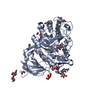
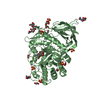
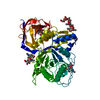
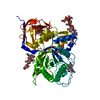
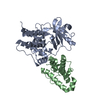

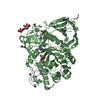
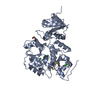
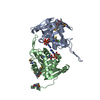
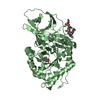
 PDBj
PDBj
